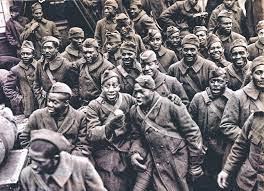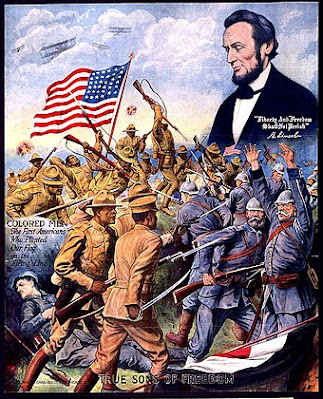Annamaria on Monday
My work in progress these days is the fifth in my Africa series, set in 1915 against the background of WWI. You might think you that my topic today is something that I discovered by accident while researching that awful conflict. But no! I learned about the Harlem Hellfighters during a casual casual conversation with a vendor in the Union Square farm market. We were talking about music. I'll get around to the music in a minute. First, who were the Harlem Hellfighters?
The regiment of today's topic was formed in New York State, comprised of black volunteers who wanted to join up and fight for their country despite the despicable way a lot of their countrymen treated them. They, largely mistakenly, believed that if they showed their valor and patriotism, they might earn the respect that they merited.
Valorous they were!! The 396th Infantry was organized in June of 1916 in New York and went through combat training in October 1917 at Camp Wadsworth in Spartanburg, SC--not exactly a welcoming locale. But, according to the men of the regiment, the nasty Jim Crow treatment they received in South Carolina forged a bond among them that stood them in good stead when they faced combat.
And face it, they did. They shipped out from New York for France on December 27, 1917. At first they were relegated to only lowliest tasks, but in April of 1918, the US Army decided to assign the unit, which wanted to serve in combat, to the French Army. The French welcomed them as comrades in arms and assigned them the French 185th Infantry Brigade. They were issued French weapons and gear to go with their American uniforms, and a month later, they went into the trenches as part of the French 19th Division.
They proceeded to distinguish themselves in battle after battle. At one point they were under fire for over six months, the longest deployment for any unit during that war. Six days after the armistice, they were the first Allied unit to reach the banks of the Rhine.
One of the most decorated was Pvt. Henry Johnson, who had been a railway station luggage porter in Albany, New York. Along with Pvt. Needham Roberts, he fought off 24 Germans, who were attacking their observation post. Roberts was badly wounded early on. Johnson, after spending all of his ammunition, fought back with grenades, with the butt of his rifle, and finally with a knife. He was able to turn the Germans away. He himself sustained 21 injuries. He became the first American to be awarded the Croix de Guerre!
It took until the Obama administration for his heroism to be properly recognized by this own country.
Now, about that music: the Hellfighters Marching Band. The fabulous musicians, recruited from jazz and ragtime musicians in NYC, were lead by James Reese Europe, a composer and prominent musician in Harlem before the war. The band went to France with the soldiers and while there were the first to introduced jazz to the French and other Europeans. They were a sensation in Paris and remained one in the United States after the war. I heard about them in that conversation at the market. I came home, found a sample on YouTube, and went straight ahead and bought all of their available recordings at the iTunes store. They are perfect! I wish I could give you a better-mastered recordings, so impressed was I of how elegantly they played. Here is a scratchy example, the best I can share on Blogger.


































































